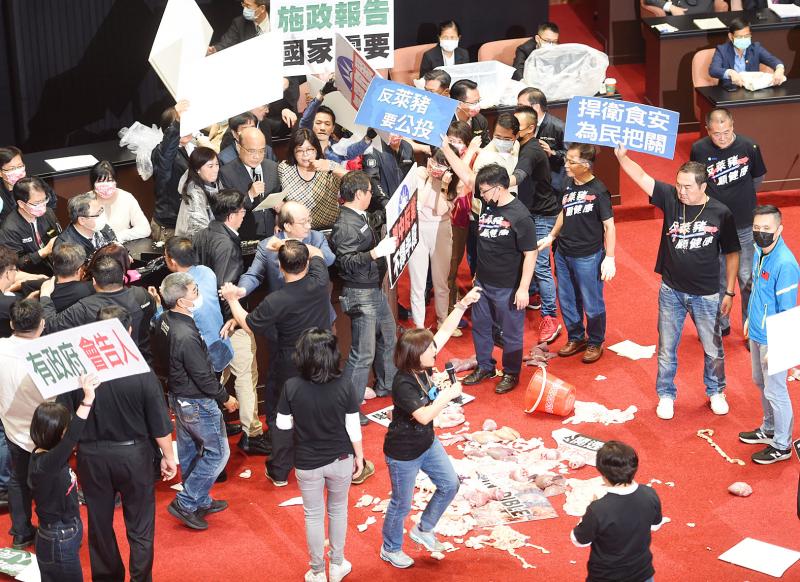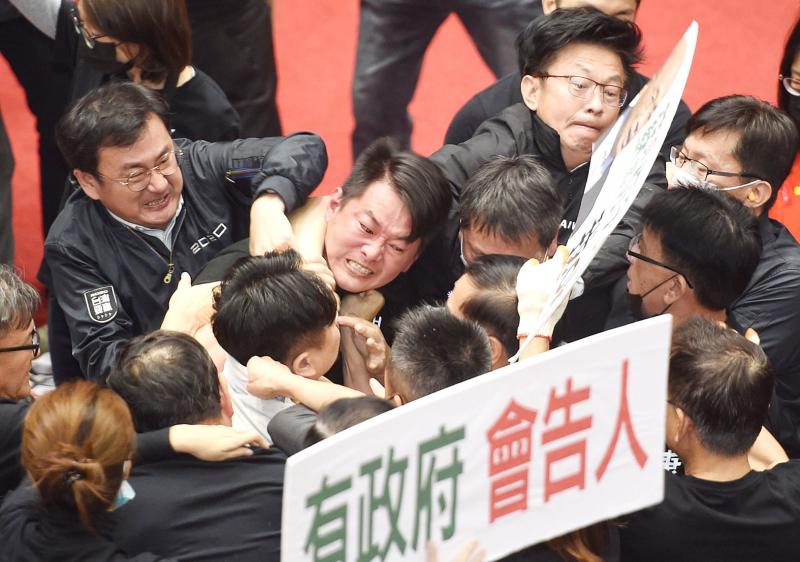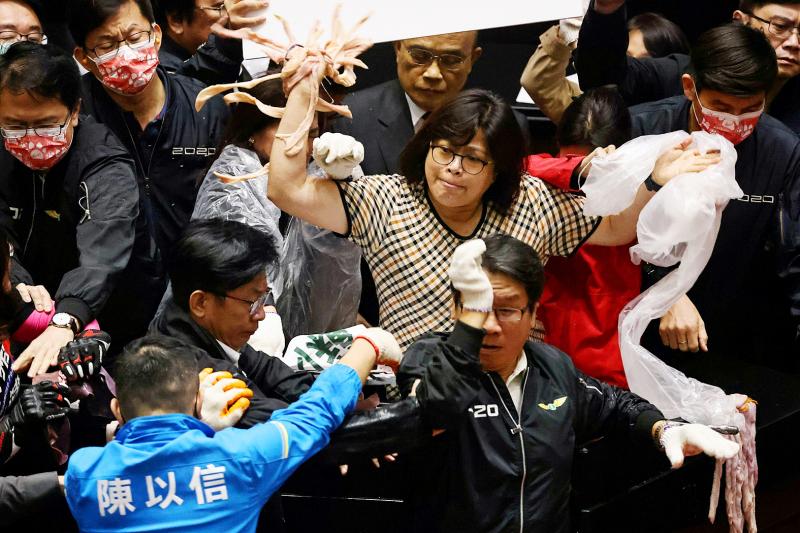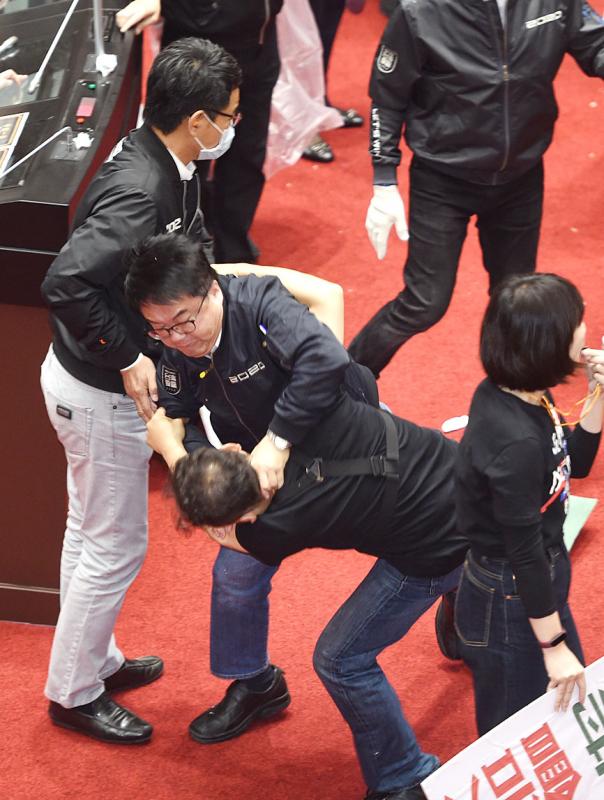Chinese Nationalist Party (KMT) lawmakers yesterday pelted Premier Su Tseng-chang (蘇貞昌) with pig skin and entrails as he addressed the Legislative Yuan on pork imports for the first time since the KMT’s boycott began on Sept. 18.
Opposition lawmakers have been demanding an apology from the government for its decision to lift its ban on the importation of US pork containing residues of the livestock drug ractopamine.
After Su arrived at 10am for his 13th attempt to deliver a regular policy report, the Democratic Progressive Party (DPP) caucus moved to change the agenda to accommodate the premier.

Photo: Liu Hsin-de, Taipei Times
The motion resulted in cries of dissent from across the aisle, as KMT Chairman Johnny Chiang (江啟臣) protested that Legislative Speaker You Si-kun (游錫堃) was rushing to a vote without addressing the KMT’s objection.
After the motion passed, Su took the podium at 10:20am surrounded by DPP lawmakers. KMT legislators attempted to drown him out with whistles and air horns, dumping buckets of pig skin and offal on the podium and the floor.
In his five-minute report, Su said that the government would continue its efforts to protect food safety in Taiwan with the same diligence applied to dealing with the COVID-19 pandemic and previously with African swine fever.

Photo: Liu Hsin-de, Taipei Times
There are to be on-site inspections at US meat factories, clear labeling of the products and strict enforcement of the regulations, he said.
Taiwan must open up to the international community and connect with the global economic network, Su said, adding that the US is Taiwan’s most powerful ally.
While Su gave his report, scuffles broke out between KMT lawmakers dressed in black shirts that read: “Oppose ractopamine pork, consider health,” and DPP representatives.

Photo: Ann Wang, Reuters
At one point, KMT Legislator Sra Kacaw (鄭天財) was knocked over by Taiwan Statebuilding Party Legislator Chen Po-wei (陳柏惟) when he bent over to grab a garbage bag. KMT caucus whip Lin Wei-chou (林為洲) and others leaped forward to drag Chen away by the neck, causing a scuffle to erupt that was quelled by DPP lawmakers.
Sra Kacaw later said that he was not shoved over, although Chen should not have pushed him.
The legislative floor was also dotted with placards from both sides, with slogans such as “Oppose ractopamine pork — not US pork” and “Much ado about nothing.”

Photo: Liu Hsin-de, Taipei Times
Afterward, Lin, Chiang and other KMT lawmakers convened a news conference outside the legislative chamber to apologize for the events of the morning while defending their actions.
Lin apologized for the KMT caucus’ use of pig entrails, saying that it was meant to emphasize that US offal containing ractopamine would be imported to Taiwan, as the US rarely utilizes these parts.
At the very least, the caucus is calling for complete factory inspections and clear labeling, he added.
Chiang said that the day’s proceedings were deeply flawed, from before the start of the session to You’s handling of legislative procedures, adding that Su never should have been allowed to take the podium.
“President Tsai Ing-wen (蔡英文) keeps claiming that this is for the nation’s benefit, but is public health not in the nation’s interest?” Chiang asked.
DPP lawmakers convened their own news conference shortly thereafter, accusing the KMT of losing their minds to factionalism.
The KMT in its calculations is no longer thinking about the country or the functioning of the legislature, DPP caucus whip Ker Chien-ming (柯建銘) said.
Under Chiang’s stewardship, instead of considering how to question the premier or ministers, the KMT is only concerned with how to destroy the legislative forum, Ker added.
The DPP called on its counterparts across the aisle to turn around its behavior or risk forever relegating itself to the status of opposition party.
Additional reporting by Huang Hsin-po and CNA

Taiwan is projected to lose a working-age population of about 6.67 million people in two waves of retirement in the coming years, as the nation confronts accelerating demographic decline and a shortage of younger workers to take their place, the Ministry of the Interior said. Taiwan experienced its largest baby boom between 1958 and 1966, when the population grew by 3.78 million, followed by a second surge of 2.89 million between 1976 and 1982, ministry data showed. In 2023, the first of those baby boom generations — those born in the late 1950s and early 1960s — began to enter retirement, triggering

ECONOMIC BOOST: Should the more than 23 million people eligible for the NT$10,000 handouts spend them the same way as in 2023, GDP could rise 0.5 percent, an official said Universal cash handouts of NT$10,000 (US$330) are to be disbursed late next month at the earliest — including to permanent residents and foreign residents married to Taiwanese — pending legislative approval, the Ministry of Finance said yesterday. The Executive Yuan yesterday approved the Special Act for Strengthening Economic, Social and National Security Resilience in Response to International Circumstances (因應國際情勢強化經濟社會及民生國安韌性特別條例). The NT$550 billion special budget includes NT$236 billion for the cash handouts, plus an additional NT$20 billion set aside as reserve funds, expected to be used to support industries. Handouts might begin one month after the bill is promulgated and would be completed within

The National Development Council (NDC) yesterday unveiled details of new regulations that ease restrictions on foreigners working or living in Taiwan, as part of a bid to attract skilled workers from abroad. The regulations, which could go into effect in the first quarter of next year, stem from amendments to the Act for the Recruitment and Employment of Foreign Professionals (外國專業人才延攬及僱用法) passed by lawmakers on Aug. 29. Students categorized as “overseas compatriots” would be allowed to stay and work in Taiwan in the two years after their graduation without obtaining additional permits, doing away with the evaluation process that is currently required,

IMPORTANT BACKER: China seeks to expel US influence from the Indo-Pacific region and supplant Washington as the global leader, MAC Minister Chiu Chui-cheng said China is preparing for war to seize Taiwan, Mainland Affairs Council (MAC) Minister Chiu Chui-cheng (邱垂正) said in Washington on Friday, warning that Taiwan’s fall would trigger a regional “domino effect” endangering US security. In a speech titled “Maintaining the Peaceful and Stable Status Quo Across the Taiwan Strait is in Line with the Shared Interests of Taiwan and the United States,” Chiu said Taiwan’s strategic importance is “closely tied” to US interests. Geopolitically, Taiwan sits in a “core position” in the first island chain — an arc stretching from Japan, through Taiwan and the Philippines, to Borneo, which is shared by